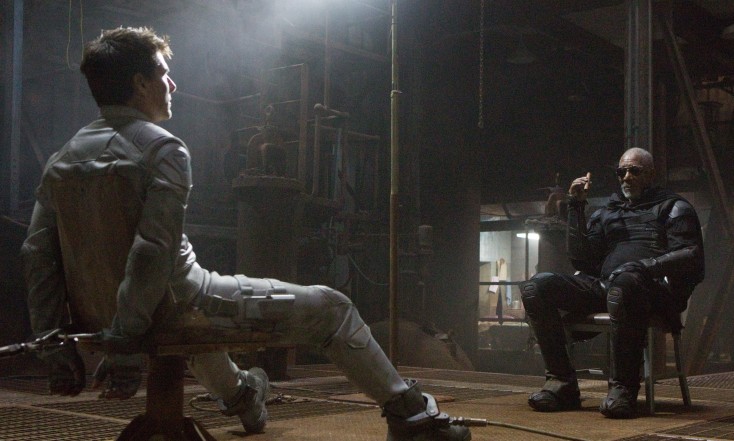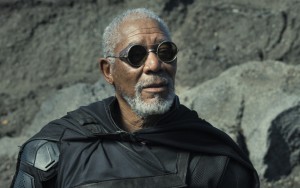By ANGELA DAWSON
Front Row Features
HOLLYWOOD—Although Morgan Freeman and Tom Cruise have headlined Hollywood films for decades, the two prolific actors never appeared onscreen together until this year. (Freeman narrated the 2005 Cruise starrer “War of the Worlds,” but the two did not interact in the film.)
The A-list actors first met at the 1990 Academy Awards, where each was nominated for Best Actor. (Daniel Day-Lewis won for “My Left Foot.”) Freeman was up for his heartwarming performance as the faithful chauffeur in “Driving Miss Daisy,” Cruise for his transformative role as a wounded Vietnam War vet who becomes an anti-war activist in “Born on the Fourth of July.” The two formed a friendship and agreed they should work together “sometime,” but neither expected that nearly a quarter-century would pass before the right project arrived.
Freeman, 75, and Cruise, 50, co-star in the sci-fi action thriller “Oblivion,” fighting initially on opposite sides for control of an alien-invaded Earth. The film is directed by “TRON: Legacy” filmmaker Joseph Kosinski, who wrote the graphic novel on which script is based.
Cruise plays Jack Harper, a drone repairman stationed on the mostly evacuated planet in the year 2077. Freeman is Beech, the charismatic leader of a band of survivors. After Jack rescues a beautiful stranger (“Quantum of Solace”’s Olga Kurylenko) from a downed spacecraft, a series of events force Jack to question everything he thought he knew about the planet he is preparing to abandon.
Cruise calls Freeman an “extraordinary” actor and “a wonderful man.”
“I’m sad it took so many years before (we worked together),” he says of his fellow thespian, who won a Best Supporting Actor Oscar for “Million Dollar Baby” in 2004. “But I’m happy to have had the opportunity to work with him.”
Though Freeman has reached an age at which many have been retired for a decade, the peripatetic actor shows no signs of stopping, or even slowing down. He currently can be seen in theaters in the hit action drama “Olympus Has Fallen.” His upcoming projects include the heist film “Now You See Me,” the action adventure “The Last Knights” and a voice role in the animated “LEGO: The Piece of Resistance,” based on the popular children’s toy.
On the day following “Oblivion”‘s Hollywood premiere, Freeman arrives for a press conference at a Universal Studios sound stage dressed casually in a denim shirt to talk about finally working with Cruise, playing a somewhat mysterious rebel leader and being a Hollywood legend. The veteran performer doesn’t suffer fools gladly, sometimes responding tersely to poorly thought-out questions. Nevertheless, he is charming, witty and gives much thought to his answers.
Q: Do you and Tom Cruise have different ways of approaching a role, or do you work similarly?
Freeman: (sounding frustrated) I don’t know.
Q: What about on set?
Freeman: Everybody works the same. The preparation you have very often may be different, but you cannot work differently. You have to say the words that were written on the page and you have to make your mark. That’s the work.
Q: This sci-fi film said something positive about humanity, which we don’t really see much in movies anymore. Without giving too much away, can you talk about that?
Freeman: No. If I talk about it, I’m going to give something away, aren’t I? But I will give it a shot. One of the themes that stands out in this film is the love story. It’s not like one we’ve seen before. Then there’s the awesome technology—that bubbleship can be remotely controlled. I agree with you that this one is unlike many (sci-fi movies) we’ve seen. It’s very intelligent and extremely creative. (Director) Joseph Kosinski designed these doggone toys. Awesome! Those drones are things you can’t believe but they are believable (in this). All right? Is that good enough?
Q: When you first read the script, what aspect of your character appealed to you most and why?
Freeman: When I first read it, there’s talk about the mysteriousness of this group, which at the outset, you don’t see. They are there, but you don’t see them.
Q: You got a chance to play with machine guns in this. What was that like? Was that your decision?
Freeman: No, I don’t make decisions like that. (He laughs.) It was written (in the script) that (my character) gets up there and manages the machine gun. How these things work out is strictly the writer’s thing. It’s not the director and not the actor’s choice. It was fun. I had never dealt with a 50-caliber machine gun before.
Q: What attracted you to taking on this role in this film?
Freeman: Tom Cruise. It’s a Tom Cruise movie. If I was going to be a truck driver hauling supplies (for this film), I would have taken the job. I’m one of his huge fans. I have been one for I don’t know how many years—way way way back. At this point, I’m not going to be offered a minor role. If you compare the script to the movie, they don’t compare, but I was excited by the script. The movie is so much more than what you read on the page. But it’s a big draw. It’s a big science fiction film with Tom Cruise. It’s hard to go wrong.
Q: Why has it taken so long for you to make a movie with Tom Cruise?
Freeman: When we say we want to work together and we’re looking for something to do, that’s not an active thing. If that was the case I would have been in “Mission Impossible” 1, 2 or 3. But when the right project comes along, it’s sort of a domino effect. Everything falls into place. This was the perfect genre for me to be involved in with Tom, so I no longer resent having not done anything with him before. (He laughs.)
Q: What were your first impressions of Tom when you first met him at the Oscars? Have you followed his career since?
Freeman: The first time I saw him was in “Risky Business.” He was awesome. When his (character’s) parents walked out of the house and he slid into frame in his Jockeys and did that whole (dance) thing, I thought, “This kid is awesome!” I don’t know if there is anything he has done since that I haven’t appreciated. I shouldn’t say “since,” because I’ve seen stuff he’s done way before (“Risky Business”). He did this fairy tale movie, “Legend.” He’s just born to do this. Born to do it.
Q: How would you envision the future ideally?
Freeman: We would all live in trees. We would all hunt for our food. We would walk wherever we went. The planet would be rejuvenated. We wouldn’t be killing off all the animals just to feed us. I would like to change it like that.
Q: You have a distinctive costume in this. Did you have any input on how your character was dressed? How much did it affect your performance?
Freeman: The costume is probably the second ingredient in (forming a) character—the script being first. I always find that the costume does a lot to cement your character, to put it firmly in mind. With this costume I remember going for the fitting. It took maybe a half hour to get into it, but then I looked at it and I walked all over the office showing it off and it was, shall we say, instructive.
Q: You look very good in cape.
Freeman: Thank you very much. Maybe I should just buy myself one and wear it!
Q: Does this job ever get old for you or do you enjoy it every single day?
Freeman: I enjoy it every single day. I was born to do this too. I really do, I enjoy it every single day. It’s not like I have to get up every morning Monday through Friday and go to a job. You do a movie, however long it lasts, and it begins and it ends in a relatively short period of time. So in a given period of time, let’s say a year, you can have three, four or five different experiences, which is kind of exciting.
Q: Is fame and people shouting out your name on the red carpet still exciting for you?
Freeman: I used to watch Jack Paar, who was “The Tonight Show” host before Johnny Carson, and one night one of my movie heroes, Humphrey Bogart, was on the show. Humphrey was asked a similar question about pictures, autographs and the public, and Bogart said, “I don’t owe the public anything but a good performance.” I tried to take that to heart, but not quite so. Somebody once told me, “You belong to us. You’re in the public.” So you can’t quite get away from it. I don’t do autographs; they are a waste of time, but photographs stay. Touching someone’s hand, hugging a beautiful lady—all of that works out very well. So I wanted to adopt Humphrey Bogart’s dictum but it doesn’t work for me. I think I owe the public a little bit more than just a good performance. I owe them just a little bit of my time … if I’m cornered.
Q: You’ve had the opportunity to work with directors from different generations. Is there anything different about working with a relative newcomer like Joseph Kosinski as opposed to some of the older guys like Rob Reiner or Clint Eastwood in regard to their approach to filmmaking?
Freeman: The two older directors that you mentioned happen to have a couple of things in common. Speed being one of them. I like speed. Younger directors don’t seem to embrace that so much.
Q: What do you look for in scripts these days? What excites you as an actor?
Freeman: I don’t know. Different things. I can’t say. If you sat down and wrote a script, you may write something that is way beyond something you’ve ever seen me do. But if you thought of me to do it, I would be flattered to be asked to do something other than be wise. Did I answer your question? Sometimes I’m pretty good at talking around things.






